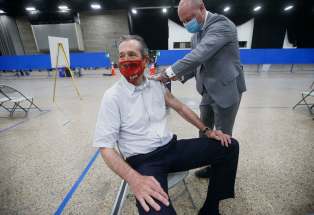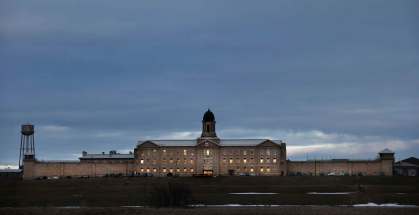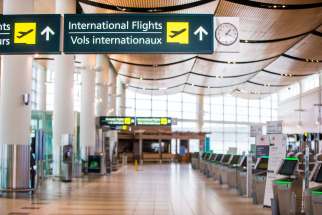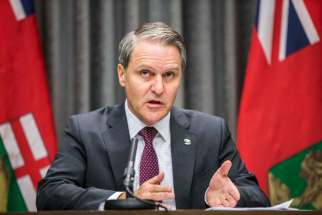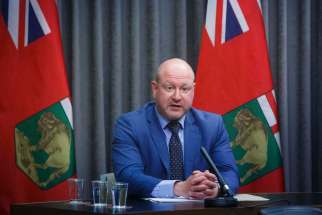Manitoba-North Dakota deal borders on embarrassment, modest victory
Read this article for free:
or
Already have an account? Log in here »
To continue reading, please subscribe:
Monthly Digital Subscription
$0 for the first 4 weeks*
- Enjoy unlimited reading on winnipegfreepress.com
- Read the E-Edition, our digital replica newspaper
- Access News Break, our award-winning app
- Play interactive puzzles
*No charge for 4 weeks then price increases to the regular rate of $19.00 plus GST every four weeks. Offer available to new and qualified returning subscribers only. Cancel any time.
Monthly Digital Subscription
$4.75/week*
- Enjoy unlimited reading on winnipegfreepress.com
- Read the E-Edition, our digital replica newspaper
- Access News Break, our award-winning app
- Play interactive puzzles
*Billed as $19 plus GST every four weeks. Cancel any time.
To continue reading, please subscribe:
Add Free Press access to your Brandon Sun subscription for only an additional
$1 for the first 4 weeks*
*Your next subscription payment will increase by $1.00 and you will be charged $16.99 plus GST for four weeks. After four weeks, your payment will increase to $23.99 plus GST every four weeks.
Read unlimited articles for free today:
or
Already have an account? Log in here »
Hey there, time traveller!
This article was published 29/04/2021 (1687 days ago), so information in it may no longer be current.
It could be one of the worst decisions Premier Brian Pallister has made, or one of the best.
Facing criticism for a leisurely rollout of the province’s COVID-19 vaccination campaign, Pallister recently struck deals with North Dakota to have Manitoba truckers and (perhaps) teachers vaccinated in the U.S.
Manitoba truckers travelling on I-29 highway can visit a pop-up clinic at a rest stop near Drayton, N.D., about 50 kilometres south of the border.
On April 21-22, the first two days the clinic was open, more than 100 Canadians got a U.S. jab.
Based on the success of that program, Pallister announced Thursday he was putting together a deal to allow school teachers to drive across the border, specifically for the purposes of getting vaccinated, and return without doing any cross-border shopping or having to undergo a 14-day quarantine.
The logistics of vaccinating teachers in North Dakota is still a little murky, given their work does not normally require them to cross borders.
As a result, the early reviews have not been positive.
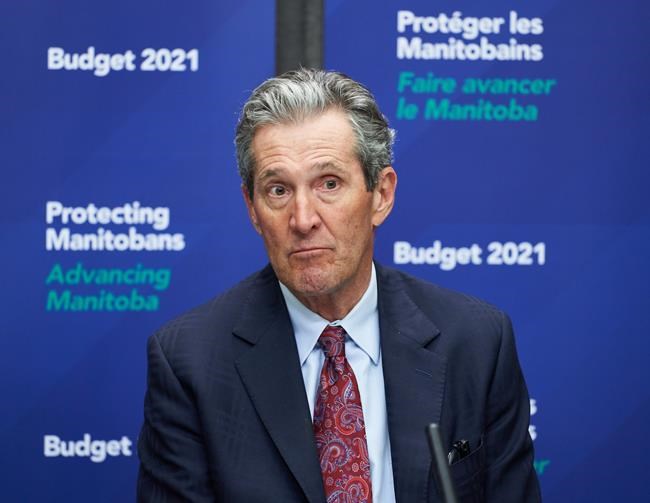
The Manitoba Teachers’ Society called it an unacceptable solution; NDP Leader Wab Kinew called it a cheap gimmick designed to distract attention away from the government’s troubled vaccine program.
So, is this a bad decision by Pallister, an admission he cannot get all Manitobans vaccinated without help from North Dakota?
Or, is this a good decision, a rare moment when the premier has stowed his legendary political vanity just long enough to do the right and practical thing?
Before making a final determination, we should note Manitoba is not the only western province tapping into the vaccine supplies of border states.
Saskatchewan struck a similar deal with North Dakota for truckers, while some Indigenous and non-Indigenous residents of southern Alberta have been invited to cross over to a vaccine clinic operated by the Blackfoot Confederacy in northwestern Montana.
In British Columbia, Canadians have been flocking to Washington, where there is too much vaccine and too little interest at pharmacies about providing proof of citizenship.
It’s also important to note North Dakotans don’t seem all that worried about giving away their vaccine doses.
When Gov. Doug Burgum announced April 20 his state would vaccinate 4,000 Canadian truckers, there was almost no evidence of local backlash. One reason may be, in addition to having a huge stockpile, North Dakota has the second-highest rate of vaccine hesitancy in the U.S.Pallister has been careful not to blow this up into some sort of seminal moment.
According to survey data compiled by the U.S. Centers for Disease Control and Prevention, 29 per cent of North Dakotan adults are hesitant to take the vaccine, including 19 per cent who are very hesitant.
Only Wyoming has a higher degree of doubt (31 per cent hesitant, 17 per cent very hesitant).
From arrival of the first shipments of vaccine, North Dakota officials have said they want to vaccinate 70 per cent of all residents, which really is the minimum level to establish some form of herd immunity.
As late as this week, however, only about half of state residents had received a jab, and public health officials were expressing some doubt .
“We knew (70 per cent) was going to be a lofty goal,” immunization director Molly Howell told the Grand Forks Herald on April 26. “I think it’s going to take a bit of work, a bit of time.”
So, all things being equal, and given the alternatives, it appears Pallister did the right thing.
It must have been hard; the premier has an unhealthy obsession with bragging about Manitoba’s pandemic response, to the point of exaggerating and embellishing facts beyond recognition.Given the Pallister government’s deep commitment to keeping schools open, come hell or high community transmission rates, teachers really should have been prioritized for vaccination weeks ago.
In this instance, however, given North Dakota’s peculiar situation — too much vaccine, too few residents interested — it would have been silly not to take advantage of the governor’s largesse.
Pallister has been careful not to blow this up into some sort of seminal moment. “It’s just another way to help people get vaccinated,” he said Thursday.
That said, what is good for truckers may not be so good for teachers (unless you are a teacher working close to the border).
Teachers in other areas of the province have good reason to be concerned about being told the only way they can get a vaccine sooner is to take a day off work and drive to a highway rest stop in rural North Dakota.
Given the Pallister government’s deep commitment to keeping schools open, come hell or high community transmission rates, teachers really should have been prioritized for vaccination weeks ago.
Their omission from the initial cohort of priority groups seems more of a political decision than one based on public health concerns.
In the end, this is one of those stories that proves a fundamental principle of politics: although politicians will never make everybody happy, at some point, they’re going to piss off everyone.
dan.lett@freepress.mb.ca

Born and raised in and around Toronto, Dan Lett came to Winnipeg in 1986, less than a year out of journalism school with a lifelong dream to be a newspaper reporter.
Our newsroom depends on a growing audience of readers to power our journalism. If you are not a paid reader, please consider becoming a subscriber.
Our newsroom depends on its audience of readers to power our journalism. Thank you for your support.
History
Updated on Thursday, April 29, 2021 8:26 PM CDT: Fixes typo.
Updated on Friday, April 30, 2021 7:13 AM CDT: Fixes typo.


